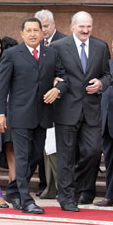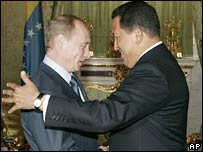"This can't last: it's too stupid."Caracas can't be said to have the most vibrant intellectual life in Latin American, but at least we've got Ibsen Martinez. Witty, agoraphobic, shamelessly erudite, misanthropic and totally brilliant, Ibsen really has no peer in the intellectual life of the country. A theoretical mathematician by training, the guy made his name writing soap opera scripts, believe it or not...which says something about the intellectual climate around here, doesn't it - where else could a serious intellectual get his start writing soaps? He proved too unpredictable and prima donnaish to make a proper script-writer - he'd just get sick of them at some point and stop writing, but eventually found his niche in the newspaper and the world of the novel. His weekly screeds in El Nacional have a following, more than a readership, a following I'm proudly part of. Ibsen's writing is really in a class of his own as far as op/ed writing goes in this country: deeper, clearer, wittier, sharper, and more illuminating than anyone else writing in Caracas, and often by a long long ways. He's like our own little Garcia Marquez, but without the international acclaim, or the fidelismo.
His column today is one of the more sobering things I've read in a while: one of his better ones, which is really saying something. It's useless trying to gloss it, since it's so good, so I'm going to take the time to translate the whole thing. It really is that good. [The original in Spanish is
here.]
He starts off by citing Camus' The Plague:
"Plagues, in fact, are quite common, but it's hard to believe in them when you see them fall on your head. There have been in the world as many plagues as wars, and yet, plagues and wars always catch people by surprised. When a war starts, people say "this can't last, it's too stupid." And, without a doubt, war is obviously too stupid, but that doesn't keep it from lasting. Stupidity always insists; one would realize that if one were not always thinking of oneself. Our countrymen, in this respect, were like everyone else. They were humanity. They didn't believe in plagues."
"The plague is not made on a human scale, and therefore men always say that the plague is unreal, a bad dream that must pass.
"But it doesn't always pass, and from one bad dream to the next, it's the men who pass, and the humanists first of all, because they haven't taken precautions.
"Our countrymen were no more guilty than others; they forgot their humility, that's all. And they thought everything was possible for them, which meant that as a matter of course that all plagues were impossible.
"And how could they have thought of the plague, which suppresses the future, their movements and their discussions? They thought themselves free and no one could be free so long as there were plagues.leaving the quote, Ibsen writes,
On this Saturday, I want to call the reader's attention to a disquieting notion that Camus slides in front of us: that plagues and wars always catch people unaware. Especially civil wars, I'd add.
It bears stopping to reflect on Camus' words, right now, in the wake of a very justified protest work stoppage that some -very few, but very powerful- people would like to twist and stretch until turning it into the pretext for military intervention.
Camus, as is well-known, wasn't precisely the contemplative kind, nor a coward: he did for the French resistence what very few of his own intellectual establishment did, and with such daring and intelligence, during the nazi occupation. So Camus knew what he was talking about when he said that the first reflex you have towards the absurdity that war engenders is to tell yourself that "this can't last, it's too stupid."
"This can't last: it's too stupid," says the father in "The bicycles are for summer," the acclaimed Spanish film by Jaime Chavarri, based on a play by the great Fernando Fernán Gómez, with the whole family gathered at dinnertime, one night in July 1936, commenting on the news that had come over the radio that afternoon: in a remote overseas garrisons an obscure colonel named Francisco Franco had led an uprising against the Spanish Republic.
The head of the family shrugs his shoulders and, next to him, all the characters keep on living their petty bourgeois Madrid lives, neither too rich nor too poor, neither conservative nor leftist enough to feel that what had just started could have anything to do with them, much less that any of its consequences might reach them.
But things don't turn out the way they'd imagined - "how could they have thought of the pest, which suppresses the future, their movements and their discussions? They thought themselves free and no one could be free so long as there were plagues" - and the movie ends when only the viewers know that there will be no other summer with bicycles because that "which couldn't last, because it was too stupid" has become a frightful war that in three indelible years left a million dead and one of the most abhorrent and ignominious dictatorships of the last century.
It just happens that both sides made the same mistake: underestimating the other. The fascists thought it would be enough with a military coup, the republican government calculated that it could put the coup down easily.
It's taken almost sixty years for the philosopher Julián Marías - the father of Javier, the novelist - to come to grips with the decisive event for three generations of Spaniards. He does it in Being Spanish, a book that should be required reading for all of those - chavistas or not - who aspire to act constructively in Venezuela's XXI century politics.
They would then witness Marías elucidating how it was possible to reach war, and saying that, to our discomfort, the primordial cause of the catastrophe was not "the disagreements, or the confrontations, not even the struggle, but rather the will to not get along, the determination to see the 'other' as unacceptable, intolerable, unbearable."
It's inevitable to think of today's Venezuela when Marías carefully recreates as a gift to his reader, the mechanism whereby "groups were formed that would enter the category of the mutually irreconcileable." Or when he points out how that diabolical will to not get along brought about "the successive entry of parts of the social body in what one might call automatic opposition."
Slowly at first, but later on incredibly fast, the entire material and social life of Spain gave in to the primacy of the political, "such that every other aspect was obscured: the only thing you needed to know about a man, a woman, a book, a company, a proposal, was whether it was from 'the right' or 'the left' and your reaction was automatic. Politics eclipsed every other consideration."
These burning pages, written by a Spaniard on his own history, discuss something that many suppose cannot happen in Venezuela "because it's too stupid." What's interesting - and alarming - is that almost every paragraph seems to refer to the current political scene in Venezuela.
The similarities are laid bare when Marías discusses the way the intellectual life and the social production of meaning in Spain went up in smoke, in what he describes as "a collective retreat from intelligence, a frightful narrowing by way of simplification: the infinite variety of reality was, for many, reduced to mere stencils or labels, designed to unleash automatic reflexes, elementary, unnuanced reflexes. This led to a tendency towards abstraction, dehumanization, a necessary condition to generalized violence. And lazyness, especially, when it came to thinking, to looking for intelligent solutions to problems; to imagine the others, to imagine their point of view, to understand their reasons, their fears. And also to carry out with continuity the acts needed to solve or lessen those problems, to put in place an attractive alternative. Magic was easier, the verbal solutions that do away with thought.
"The war was a consequence of frivolity. This seems to me the key word. Spanish politicians, almost without exception, most of the church, a large number of those who thought of themselves as 'intellectuals' (and, of course, of the journalists), most of the economically powerful (bankers, businessmen, large landholders), the union leaders, gave themselves over to playing with the gravest matters, without the least sense of responsibility, without imagining the consequences of what they did, said, or failed to say.
I read Being Spanish on the urging of a friend who had found in it the same parallels with our current situation, which I comment on today. When I closed it, I realized that if we went and asked people like Hugo Chávez, or Carlos Ortega, or Diosdado Cabello or Andrés Velásquez, or Carlos Fernández, or William Lara or Cecilia Sosa or Iris Varela or Marta Colomina if they want a Civil War in Venezuela they would surely answer that of course not, what an idea! who would wish a thing like that?
But one can only consider with infinite sadness the clear-eyed wisdom of Julián Marías, poured into words that read as though composed for us: "They didn't want a civil war, but they wanted what turned out to be a civil war: A) Dividing the country in two bands. B) Identifying the 'other' with evil. C) Not taking them into account, not even as a real danger or an efficient adversary. D) To eliminate them, get them out of the way (politically; physically if necessary.)"
And then: "Stupidity always insists. One would realize it if one didn't always think like oneself." Will we Venezuelans know how to prove Camus wrong, just once? There may be less than a week to go to decide."
Please comment responsibly:
|
"Today, we aborted a coup..."If Enrique Tejera-Paris is the best the opposition can come up with for a coupster, man, we're all in trouble here. Last night, in a comando raid broadcast live on the State-run TV channel, about 20 intelligence officers swept down on the home of Enrique Tejera-Paris, the octogenarian former foreign minister and slightly kooky intellectual. Slightly bewildered and still wearing his pajamas, Tejera-Paris went on to give a very strange interview to the Channel 8 reporter, who more or less accused him of plotting a coup. The avuncular alleged coupster put on a display of absolutely flawless manners, answering the questions as though he had been invited to a morning talk show, and endearingly referring to his tormentor as "joven."
The Channel 8 guy pointed his camera at a big map of Caracas with the words "Solucion Final" scribbled across the top, which supposedly spelled out the evil plan for staging some riots to serve as an excuse for a putsch. Tejera-Paris said they'd been planted by the DISIP agents. By the afternoon Chavez was giving another grandiloquent speech, boasting about how his intelligence services had aborted yet another fascist conspiracy.
It's hard to know what to make of the whole story. For one thing, Tejera-Paris really is a sort of walking incarnation of all that is most distasteful about the old regime: a kind of amoral insider said to be knee-deep in some very murky business in connection with the Las Cristinas mine development in Bolivar State. (Inside story is he was hired by the Canadian junior miner Crystallex to tamper with some local land registry records to bolster Crystallex's claim to the mine...unconfirmable (but then Crystallex is now in bed with the chavista CVG...it gets complicated).)
That doesn't change the fact that Tejera Paris is old. Very old. Retired. Out of the game. Mayyyyybe he's pulling all sorts of strings behind the scenes. Sounds a little fanciful to me, but it's not impossible.
On the other hand, the entire way the government has dealt with this is just another typical concatenation of abuses of power, violations of due process, and political-propagandeering. The presence of the Channel 8 camera crew stinks to high-heaven...suggesting a complex propaganda ploy rather than a standard law enforcement operation. The whole mess will need to be added to the long list of bizarre events in Venezuela's contemporary history.
Please comment responsibly:
|
"Gaviria Go Home!"More coup rumors today. My colleague has gotten three different anguished phone calls from friends who've heard the show's gonna go down tonight, but at this point we've learned to discount calls like that. Not that they're not unsettling. It's more that it seems like a matter of commonsense that by the time a coup-plot's made its way to the cellphone circuit, it's pretty well doomed to failure. So it's the days when there are no rumors that I worry. That's when the coup's going to come.
The head of the Organization of American States, Cesar Gaviria, left town this morning. OAS is one of these organizations that most people in the US barely give a second though to, but which actually carries quite a bit of weight here. Gaviria cooked up a fantastically bland little "declaration of principles" to try to get the government and the opposition to sit down together and, y'know, agree to something. Even then it proved incredibly difficult to get them to agree. It was a motherhood-and-apple-pie affair, the kind of thing no one can really disagree with. But opposition figures dithered...it's too bland, some said, it lets the government off the hook! Others refused to sign on unless Chávez personally signed first, saying that if the VP or the Foreign Minister signed on the government's behalf the declaration would have no credibility because Chávez overrules them all the time. One suspects that what's really going on here is that the idea of co-signing a document with Hugo Chávez just makes the stomachs of too many opposition leaders turn. It would grant him a level of implied legitimacy they're just not willing to concede.
On the government's side it's much the same thing. They said they would sign, but then when it became clear they'd be putting their names to a document also signed by Carlos Ortega, they didn't like that one bit. Ortega, the head of the big Labor Union Federation (CTV), is just as unacceptable to the Chavistas as Chávez is to us: Two years after he was elected by the rank-and-file (in an admittedly horribly murky election) the government still refuses to acknowledge his leadership of the federation. Signing a document along with him would mean implicitly accepting his leadership, and that's a pill the government finds it very very hard to swallow.
My guess was that this declaration of principles was Gaviria's way of testing the waters, to try to get a feel for how likely a broader agreement might be. Signs are not encouraging. So long as the government and the opposition see each other as enemies rather than adversaries, the impetus for violence will still be there.
I don't know what the solution is, but I'm pretty sure mindless intransigence isn't part of it.
Please comment responsibly:
|
Is the glass two-thirds full......or one-third empty? As Cesar Miguel Rondón - Venezuela's fat, balding version of Larry King - kept insisting on his Channel 10 show last night, the polling data has been remarkably steady over the last 10 months or so. Two out of three Venezuelans are broadly opposed to the government, one out of three supports it. According to Datanalisis' quarterly polls, the numbers haven't changed much, except for a short-lived "sympathy spike" right after The Restoration on April 14th. Whether you ask people whether they like or dislike Chávez or whether they'd vote to unseat him in a referendum, the two-to-one pattern holds up. Moreover, two-thirds of respondents consistently oppose the institutions that are most widely seen as controlled by Chávez (Congress, the Attorney General's Office, the Ombudsman's Office, etc.), and one-third supports them.
I'm sure most chavistas would dismiss Datanalisis' numbers as part of the giant conspiracy against the revolution, but then they think anything and everything that's the least bit out-of-synch with the guy's latest whim is part of the giant conspiracy against the revolution. Certainly, we heard no complaints from them between December 1998 and November 2001, when Datanalisis' polls had the Comandante in the 60-85% popularity range.
Interestingly, support for the Supreme Tribunal followed that same two-to-one pattern until August 14th, when the magistrates voted 12-8 to exonerate the army officers who'd shoved Chávez out of power in April, unleashing a storm of presidential condemnation. Chávez' could barely contain the bile he poured all over the Tribunal, repeatedly saying the decision had been bought, calling it "a turd" (
una plasta) and at one point, ominously, vowing to publish a book with the photographs of the magistrates who'd voted against his wishes "so the people knew who was responsible for this outrage." It should probably worry the president's supporters that the Supreme Tribunal's standing in the polls shot up immediately after this particular tirade, with more and more people saying they see it as a genuinely independent institution, and fewer and fewer people calling for the magistrates' resignation. In fact, the Supreme Tribunal became the first institution to fall out of the two-thirds/one-third pattern. The change happened almost immediately after Chávez' set of bombastic condemnatory speeches. The Supreme Tribunal is now liked by a third and disliked by another third of the electorate, leaving the third third bewildered. I count myself in that third-third: we've heard lots of reports that the August "majority" against Chávez was a one time fluke, and that the magistrates are now falling back in line behind the president. If so, Chávez's attacks could imaginably have been a shrewd maneuver to bolster the tribunal's appearance of independence (and therefore its standing) through a single high-profile decision, only to then bring it back as a meek member of the presidential herd.
The other place where the two-to-one ratio falls apart is in the hypothetical presidential match-ups. When Datanalisis asks the open-ended question, Chávez wins of course. He gets thirtysomething percent, while the opposition vote is fractioned among like 15 challengers. But when Datanalisis limits the question to Chávez vs. this or that hypothetical challenger, his weakness becomes clear. His strongest challengers would be Enrique Salas-Römer and Enrique Mendoza: both would beat him 61%-39%. That's a landslide in my book, even if it's not the two-to-one majority you see in the popularity questions. Salas-Römer is the right-wing former governor of Carabobo State, who lost the '98 election against Chávez by...58-39% (with the remainder going to minor candidates, including the former beauty-queen I voted for.) Mendoza, on the other hand, is a far more moderate centrist who is now governor of Miranda State, which is the state where I live and where the Eastern half of Caracas sits. Other opposition figures also beat Chávez, but by smaller margins. Greater Caracas Mayor Alfredo Peña beats him 54%-46%, former Central Caracas Mayor Antonio Ledezma barely ekes by 51%-49%. That's too close for comfort, so the opposition would really do well to stick by one of the Enriques.
Yet, even if the opposition doesn't manage to agree on a single candidate, it's not necessarily the end of the world. Even in a worst-case-scenario where both the Enriques chose to run, chances are that the election would tend to get polarized between just one of them and Chávez. Getting an early poll-lead would be the key: once voters saw which way the wind was blowing, they'd almost certainly coalesce around whichever candidate they saw as having the best chance to beat Chávez. The other Enrique would be condemned to the fate of my beauty-queen, who saw her poll-numbers drop literally 60 points between May and December. My feeling then is that if the opposition can just force an election somehow, they take Chávez out. This seems to be Chávez's theory as well: he's doing everything imaginable to avoid one.
And it's critical that Chávez is replaced through an election. Aside from all the valid idealistic reasons for demanding democratic decision-making, the fact is that he does retain the support of a third of the population. Much more relevantly, he maintains the fervent support of about 20% of the electorate, the so-called
chavistas duros (hard-core chavistas) who see him more as a mystical figure than a politician. If Chávez is pushed out of office unconstitutionally, by force, these people will never accept the outcome. At best, they'd be a constant thorn on the side of the next government, at worst they could start a civil war. It worries me that the most radicalized opposition figures out there don't seem to realize how much of a problem this is, and continue to push for extra-constitutional means of getting rid of the guy. Making sure that 20% feels included - or at least doesn't feel openly violated - by the transition to the post-chavista era will probably be the most important task of the next government. Let's hope they don't screw it up.
Please comment responsibly:
|
not sure how happy my boss will be if he sees I've posted
VenEconomy's subscription-only editorial on this free website, but christ, Caracas Chronicles has like 15 readers at this point...
It’s the deficit, stupid...How irresponsible is the government’s financial management? Look at it this way: in the first eight months of this year, the public sector’s current income averaged about Bs.1.66 trillion per month. That works out to just under Bs.20 trillion per year. Yet for 2003, the president has just announced that spending will total Bs.40 trillion. That’s twice this year’s current income, at a time when inflation is expected to run no higher than 40%.
Of course, Venezuelan budgets have always been exercises in creative accounting, legal formalities largely removed from reality. But traditionally they’ve erred on the side of understating spending. This time, it’s the opposite. Based on a hopeful 3-3.5% GDP growth projection, even the Onapre (national budget office) admits that current income won’t exceed Bs.28 trillion. That leaves the terrifying sum of Bs.12 trillion to be financed somehow (and that’s if the government’s growth estimate holds up; otherwise, it will be more.) And how is this gap to be bridged? By once again squeezing every last penny out of PDVSA, conjuring up some money out of thin air (they call it “exchange profits”) and then borrowing the rest – per Onapre estimates, a full Bs.10 trillion.
The simple conclusion is that the government just doesn’t learn. Already, the unreasonable chavista demands on PDVSA have caused a 25.5% drop in the corporation’s production capacity – with no money to spend on keeping up production, the country’s capacity has dropped from 3.5 million b/d four years ago to just 2.6 million b/d today (not including Orinoco Belt extra-heavy crudes), according to IEA estimates. This means that for the first time in history, Venezuela finds itself unable to cash in on the upside oil-shock caused by the looming US war in Iraq: there’s just no spare capacity to speak of.
The broader strategy is just as bad. By now, one might expect the chavista ruling clique to have caught on to how badly the public sector’s oversized thirst for borrowed cash has distorted the economy’s performance. By making massive deficit spending the norm irrespective of whether times are good or bad or whether oil prices are high or low, the government has already shut out the private sector from the credit market. The public sector’s snowballing demand for borrowed money keeps interest rates high, private investment rates low, and markets jittery.
As the pressure to raise more and more money increases, the government has opted for more and more unorthodox means of financing itself. First, it instituted the Bank Debit Tax, which might be described as relatively benign even though it undoubtedly generates destructive market distortions. Then, as the pressure for new cash intensified, it adopted more serious self-destructive practices, from the accelerating merry-go-round of increasingly bigger and more expensive short-term bond issues to the frankly perverse tactic of declaring purely fictitious “exchange market” profits to bankroll the government. The results are all around, and plain to see: a virtual investment freeze, rising unemployment, galloping inflation, and an unremittingly bleak outlook for the future.
Of course, much of the excess spending next year is due to higher debt service payments: the chickens of the wrong-headed financing strategies of the past coming home to roost. But rather than trying to tackle this vicious circle, rather than trying to implement a plan to return the nation’s finances to relative health, the government looks set to exacerbate the problem. Its financing plans for 2003 are a paragon of amateurish irresponsibility: on top of massive new borrowing, the government has already announced it will issue Bs.1.5 trillion in printing-press monies. Sadly, there’s just no medium-to-long-term strategy to ever break out of the deficit-spending trap. In fact, there’s no indication that the government even understands it’s in a trap at all. Under such circumstances, the only reasonable forecast is steady, ongoing deterioration.
Four years into its mandate, the Chávez administration hasn’t learned even the bare-bones basics from the mistakes it has made to date. The broad outlines of the budget plans announced so far make it clear that the wild goose chase that is the government’s quest for fresh cash will only intensify next year. The outcome is sadly predictable, and as usual, those who will suffer most will be those the president claims to champion.
Please comment responsibly:
|
“They’d told me what made Venezuela tick was oil……but now that I get here, I see that what the country really runs on is rumors.” It was the US ambassador who said that, talking to reporters last week. He’s obviously right: the twin Venezuelan love-affairs with gossip and the cell-phone leave the city awash in speculation. A constant stream of conjecture flashes across my inbox and my phone, and the topic is always the same: the near political future. Caraqueños are obsessed with the government’s overthrow…and it’s not just the opposition who talk about it constantly, even the government won’t shut up about it, denouncing coups and plots at every turn.
So what are the main theories going around these days?
Theory 1: The Crimes Against Humanity charge will do him in…The lawyers who represent some of the victims of the April 11th shootings (that’s the day of the coup) went to the Supreme Tribunal to ask for the president’s impeachment several months ago. Though the Tribunal Members were originally handpicked by Chávez and his people, a bunch of them have bolted over the last two years as the comandante has gotten crazier and crazier. The tribunal appears to be on a knife edge: last August, for the first time, it handed down a ruling that went against the president’s wishes. That prompted a furious presidential outburst calling them a bunch of corrupt bastards, basically, and threatening to “publish their pictures in a book” so they can be picked out, one presumes.
Back then, Chávez warned that that was just the first step in a process designed to have him impeached and booted out of office, calling it a conspiracy to carry out an “institutional coup.” He said, flat out, that neither he nor the army would pay any attention to the Supreme Tribunal if they started impeachment procedures, (so what’s the point of having a judicial branch, then?)
A lot of opposition members still have their hopes riding on a court ruling on this one case. It’s not that they think that the court can really unseat him. It’s that they think that if the court rules against him and he refuses to abide by the ruling, he would be stepping so far outside the democratic norm that he would give the dissident officers in the armed forces all the cover they need to topple him. From this point of view, the dissident army officers are just itching for Chávez to screw up, so they can take action without eliciting too much international condemnation.
Problem is, it probably won’t happen. Most credible head-counts at the tribunal suggest the dissidents are still two or three votes shy of the majority they’d need to put the whole strategy in motion. Still, a ruling will be handed down in the next few days. The tribunal might just leave me looking silly by ruling against Chávez, and at that point we’d go through the looking glass: a major constitutional crisis is almost guaranteed.
[Those of you wondering about the actual legal merits for impeaching him on these grounds…come on! In this atmosphere
every court decision is politically motivated!]
Theory 2: Chávez is trying to provoke a coup attempt. This theory’s been going around a lot, but it reached its fullest development in an opinion piece written by Argelia Ríos in
El Universal. Her point is that Chávez has everything to gain from a coup-attempt against him. It would allow him to finally smoke out and boot out all the dissidents in the armed forces. It would bolster his democratic credentials by painting him as a victim in international opinion. If it was violent, it would wash away the memories of the April 11th deaths. Even if it was succesful, it could play into his hands, turning him into a martyr, a victim, an unrealized promise, a dashed popular dream. A succesful coup might even see him end up taking to the hills and starting a guerrilla resistance, which is what he’s really cut out for.
This, according to Ríos, is the point of the systematic harrasment of dissident military officers (and their wives, and their daughters.) The more incitement there is, the more likely the coup will be rushed, leaked, and infiltrated – so given that a coup was likely, in any event, in the post-April atmosphere, inciting it only makes sense for the government: it multiplies the chances that it will fail. In a sense, though, inciting a coup is a desperate call for help, an acknowledgement on the part of the government that the current situation is unsustainable. Trying to strongarm the country into a post-failed-coup scenario is trying to accelerate a postdemocratic solution to the current stability crisis.
I actually think this is a generally reasonable interpretation, mostly because I think that Chávez really is that crazy, but I could be wrong. I can easily see it as a sort of semi-conscious strategy. I imagine Chávez understands the likely outcome of running roughshod over some of the best respected officers in the armed forces, as a former army officer, I’m sure he understands the intense dissent his decisions are causing within the ranks, and as a former coup-plotter himself I’m sure he understands the way that dissent is bound to lead to a coup attempt. I guess he’s calculated he can survive it and even be strengthened by it. But I also know that Chávez miscalculates all the damn time, and as Medina Gómez says, “nothing is improbable.”
Theory 3: The opposition needs to hold its breath until he goes awayAnother seemingly crazy theory that more and more people are going for: this one’s championed by Cecilia Sosa, the far-right wing former chief justice of the Supreme Court. Her theory is that people should just lock themselves at home, “toss the key out the window”, and refuse to leave the house until Chávez gives up and resigns.
It’s that old leftist canard, the insurrectional General Strike, back from the grave and warmed over in a strange right-wing guise. Like the leftist precursors of this strategy, the people who actually think this could work appear to adhere to some sort of alternative system of rationality. In a country where 9 out of every 10 families live hand-to-mouth, this strategy is fairly fantastic: for most Venezuelans, if you don’t work you don’t eat, and it’s fairly hard for me to imagine that enough of them are willing to not eat for long enough to bring the government down.
But even if they were, the actual mechanism whereby a strike obligates the president to resign remains murky and shrouded in mystery. The most likely mechanism is the one we already saw in April: a last minute military push that brings matters to a head. But after the horrid experience of April, that’s something no one wants to go through again. Fact is, these people aren’t thinking: they’re just desperate, and desperation is about the worse adviser imaginable in a situation like this.
What’s worrying is that it’s not some small lunatic fringe that’s pressing for this crazy maximalist strategy. It’s CTV, the million+ member labor union federation. It’s Fedecamaras, the big employers’ federation. It’s Acción Democrática, still the biggest opposition party, which got 400,000 people out to vote in its last primary election. It’s large chunks of the opposition. It’s a testament to how polarized the country is that so many people are really thinking of a general strike as a viable option. I guess desperate times call for desperate measures, as the old saying goes…
That’s just a smattering, but this is a long enough post. More of these to come.
Please comment responsibly:
|

 Chavez Reelection Blog: Katy documents the government's use of public resources for Chavez's partisan advantage.
Chavez Reelection Blog: Katy documents the government's use of public resources for Chavez's partisan advantage.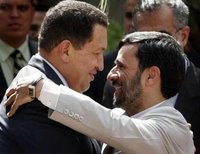
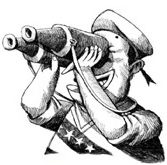
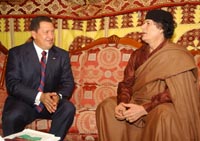
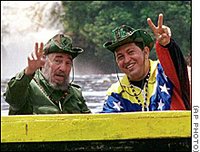
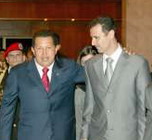
 Site feed
Site feed 